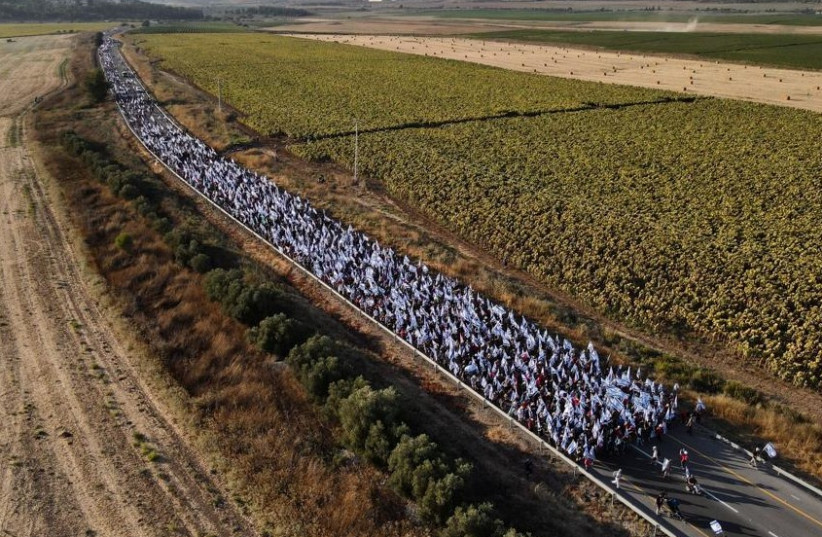The headquarters for what protest leaders called the “biggest march in Israeli history” was not Kaplan Street, Tel Aviv, but the remote community of Bnei Atarot, population 960, on Wednesday.
A few hundred protesters sprawled throughout the town to rest through the day, after marching nearly 10 km. from Tel Aviv Tuesday night. Around 5:30 p.m. Wednesday, over 500 protesters began their walk to Ben Shemen, reciting the popular “de-mo-crat-ia” chant and singing songs against the current government. One song even called coalition officials criminals, and reeled off indictments against them.
“They aren’t exaggerating,” Anat Levin, a protester, said as she walked. “It’s such a shame.”
The crowd of marchers squeezed onto the shoulder of Highway 40, creating a long trail of blue and white flags that slowed down traffic. Disgruntled commuters honked and some gave them the middle finger.
Police cars both led and trailed the marchers, having approved the route with protest leaders earlier in the day.
Moshe Raban, one of most prominent leaders of the movement, said that when the march ends in front of the Knesset on Saturday night, he expects a massive show of support when they arrive.
“This will be a historic moment,” he said. “We are Jews, and Jews go to Jerusalem by foot. So we thought that the best thing would be to return to the basics, and we’re hoping that the people of Israel will come out with us in the hundreds of thousands.”
The march was spontaneous; they began their walk just two hours after leaders announced it on Twitter Tuesday evening. However, despite the lack of planning, it all came together.
At the park next to the town’s Memorial Monument, where many marchers rested, volunteers set out a banquet of food; pizza, watermelon, rugelach, beer and water in abundance. The shoes of one protest leader, Shikma Bressler, came apart; within an hour, she had received had several offers of brand-new shoes.
Several Bnei Atarot residents even came by the park and offered hospitality in their air-conditioned homes to the weary pilgrims and a shower.
One home in particular, near the park, served as the protest leader headquarters – here, Raban, Bressler, Ami Dror, and Ran Harnevo rested, showered, ate, and planned their next moves. Outside, on the patio of the home, the march organizers discussed the route and other logistics with three local policemen.
The owners of the home, a couple who requested anonymity, said they never could have imagined helping out the anti-government protests in this way.
“There is a feeling of pride, being part of something right, something great,” the owner said, looking at the people sprawled throughout the living room. His son is going to join the army on Sunday – he said, and that impelled him and his wife to support the protests even more.
“This is the future of the country our children will fight for,” he said. Helping the protest leaders “is maybe the most important thing I can do.”
Electric energy flows through the air for marchers
Though most of the marchers had only slept a couple of hours, the energy in the home was palpable.
“We are ready to keep going, to fight for the values of our country, all day and all night,” Dror said. He added that they will keep going until one of two things happens: either the current government collapses, or the Knesset votes against the “reasonableness” bill on Sunday. Though he hopes for the former, he said he supports the democratic process which elected Prime Minister Benjamin Netanyahu to office.
But, for the sake of the country, he strongly hopes the Knesset will strike down the bill. He pointed out that the intensity of this protest – with reservists, medical workers, and hi-tech entrepreneurs threatening to strike – is unhealthy for the nation long-term.
“We’re afraid of how this government treats secular education, its racism, its violence, homophobia, chauvinism. We’re afraid that in the future our country is going to change. We won’t accept it.”
Yonaton Damichsky, protestor
For now, however, the protesters see they have no choice. Many of them were outside in the park, in 36° heat, motivated by what 18-year-old Yonaton Damichsky called “pure fear.”
“We’re afraid of how this government treats secular education, its racism, its violence, homophobia, chauvinism,” he said. “We’re afraid that in the future our country is going to change. We won’t accept it.”
Damichsky is marching by himself with little more than his sleeping bag strapped to his back. He is a veteran of judicial reform protests, but he sees this as a turning point.
“People have jobs, homes, lives, but they left it all to walk five days to Jerusalem,” he said. “Something is different. Now, we are here to stay.”
Several protest leaders have completely upended their lives for the cause, and are looking forward to Saturday night as the climax of six months of protesting. Raban quit his job, Dror placed his company on hold, sacrificing vacations and time with family.
“Now, things are moving super fast and intensive,” Dror said. “Marching together is the biggest part – now is the moment to be together, now is the moment to be strongest.”

